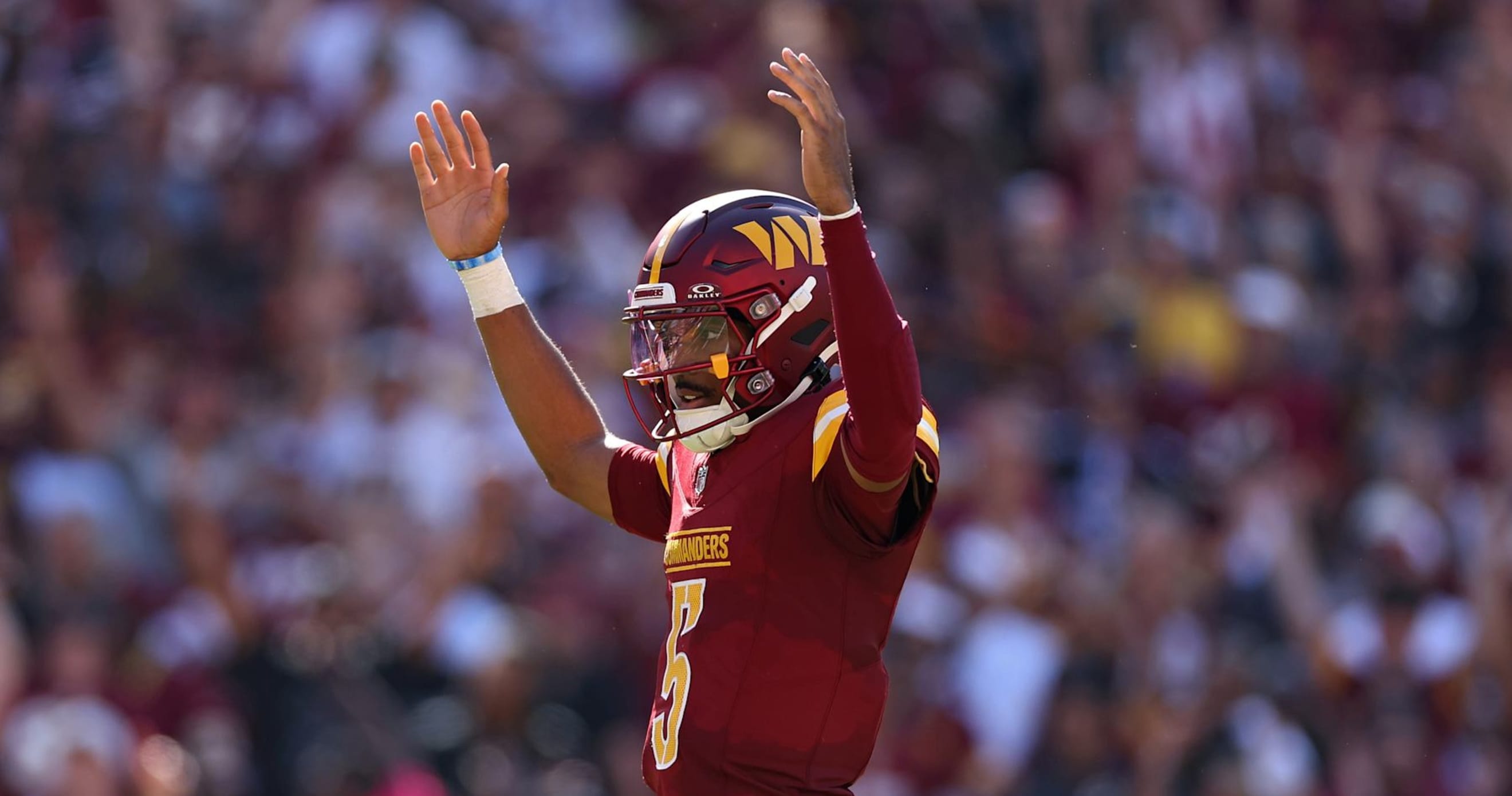
Quick Slant: SNF - Two Ouroboros-es-es for Christmas
Falcons @ Commanders, Sunday @ 8:20 PM
The Ouroboros, an ancient symbol of a serpent devouring its own tail, represents the endless cycle of life, death, and renewal. It embodies the relentless rhythm of existence, where the past and future are forever intertwined, and nothing truly begins or ends.
The Atlanta Falcons never truly begin or end either. Clearly, they were founded in 1970; they received colors and a brand; some graphic designer made an “F” into a bird and put it on a helmet, and the league plopped them down in Fulton County Stadium, where the Braves played, directly in the heart of SEC country. But it was the beginning of an idle that’s never been put into drive.
Sure, they’ve been close—remarkably close. They were handed the right to be devoured by John Elway’s Broncos when Gary Anderson's first missed field goal of the season was the one that wrecked the 15-1 Vikings in the final seconds of the NFC Championship. But closer still, they jumped out to a 28-3 lead over Tom Brady’s Patriots, only to be hunted down in the most embarrassing fashion possible. A quick Google search of no more than “28-3” returns the Wikipedia page for Super Bowl LI, where the excruciating collapse occurred; I’ve met petty Saints fans—the Falcons’ greatest rivals—who celebrate March 28th—3/28—as a holiday.
And so the Falcons continue to exist, but technically. They’ve offended no one, offered no contribution to the story of the NFL but a disastrous flop, and languish as second-class citizens in their own community—to a college team an hour’s drive away. In their way, the Falcons are the Ouroboros.
Then, there are the Commanders—once mighty, their reign of greatness ceded to the Cowboys’ dynasty of the 1990s and never rebounded. The team was bought by a narcissistic fool who dragged a fan base through mud like a ball and chain for a quarter of a century; they banged their heads against metaphorical walls, repeating a pattern like laps around a track: seek big names, sabotage their efforts, rinse, repeat. In their way, the Commanders are the Ouroboros.
Recently, a legal controversy freed the fan base and put the team in the hands of an owner with an inkling of competence; in no time, they’ve already relearned how to win. The patient few fans that haven’t traded their burgundy and gold for purple and black of the conveniently close Ravens have been rewarded for their loyalty, for years of greatness await in the form of a phenom named Jayden Daniels.
Daniels, electricity in human form, is riding the high of a five-touchdown masterpiece against Philadelphia—a game that sent the sportswriters into fits of hyperbole and probably sealed his fate as Offensive Rookie of the Year. On the other sideline is Michael Penix—another early first-rounder—cast in the role of a savior after Kirk Cousins was set aside in favor of the unknown. Now, the Falcons cling to Penix like the last unspent chip on the table.
For the Commanders, the stakes are straightforward: win and they’re in—no strings, no messy tiebreakers. The Falcons need more than a win; they need a miracle. Claiming each remaining game is their surest way to January football.
At FedExField, under the buzz of halogen, two young men stand at the edge of their futures. Legends are made on nights like this.
Falcons’ Implied Team Total: 21.5
Atlanta is the second-fastest team at the line from a neutral script—an unlikely event under a new play-caller. Their neutral run rate is pretty much league-average. Atlanta ranks second in neutral plays, tied with Pittsburgh, totaling 682, representing 68.4% of their overall plays, the sixth-highest in the league. Overall, they run 66 plays per 60 minutes, exceeding the league average.
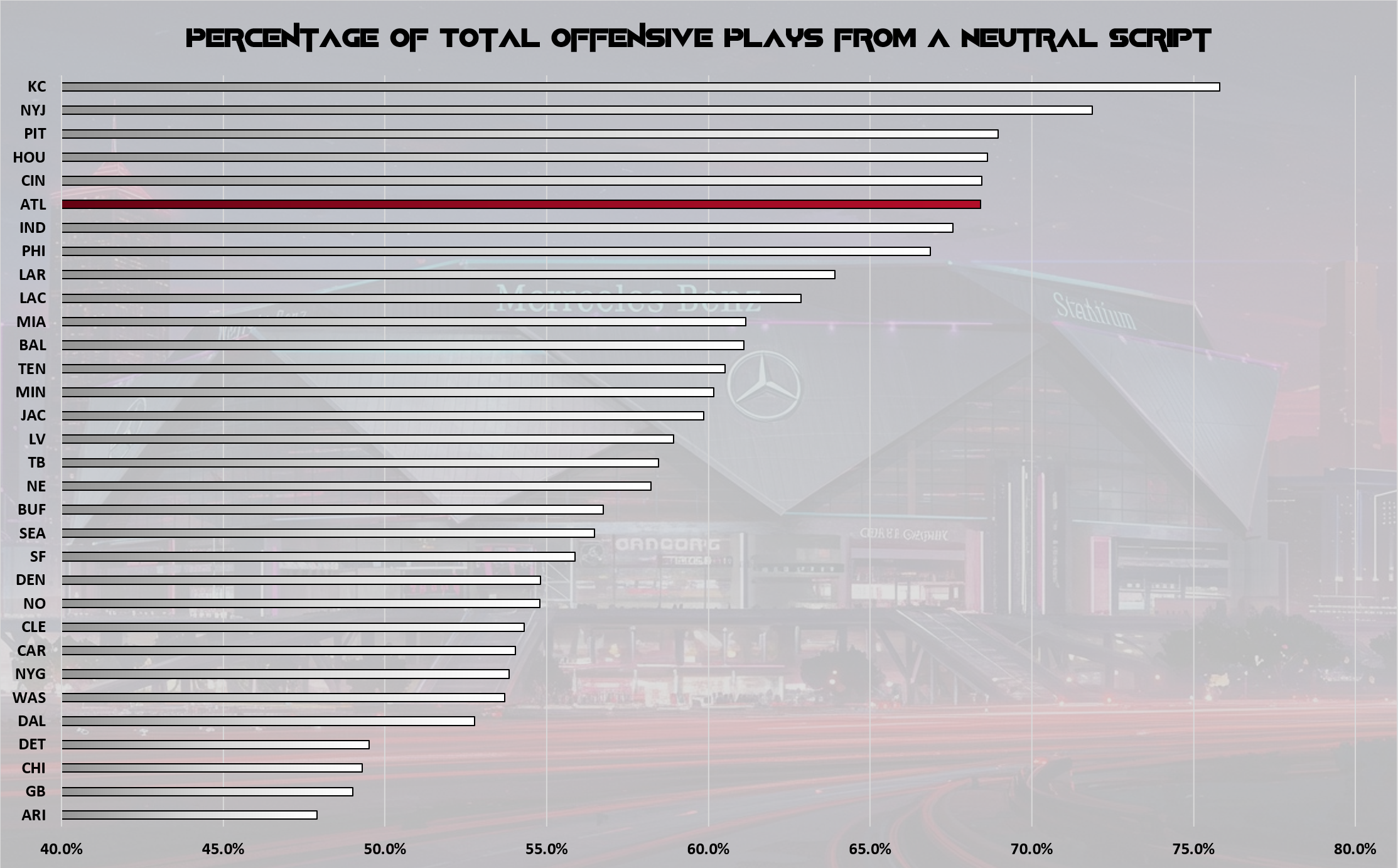
The Falcons rank 14th in EPA per play and ninth in offensive success rate. They rank 16th in EPA per dropback and tenth in offensive success rate on rushes.
Atlanta famously changed QBs recently—from long-time veteran and high-priced free agent Kirk Cousins, coming off of an Achilles tear to his plant leg, to the eighth overall pick in the 2024 NFL Draft, Michael Penix. Because Penix is a new starter, it is difficult to draw comparisons yet; he has only started one game. Also, because his skill set is different, it should intuitively prompt the Falcons to play a different brand of football.
The raw numbers didn’t shine for Penix in his first start against New York last week. The Giants are arguably the worst team in the NFL, which allowed Atlanta to bring Penix into real game action gracefully, not putting too much on his shoulders right away. It’s a one-game sample that is inherently flawed by the game’s point differential, but here’s how his per-game stats stacked up with Cousins after one.

The game environment should demand more of Penix this week. Combining for a 47.5-point over/under and playing as 4.5-point underdogs, it is unlikely the Falcons could sleepwalk to a win as they did a week ago.
The Falcons have three players with receiving market shares over 15%: Drake London (31%), Darnell Mooney (18%), and Ray-Ray McCloud (18%). Kyle Pitts has sunk out of fantasy consideration with a market share of just 12%.
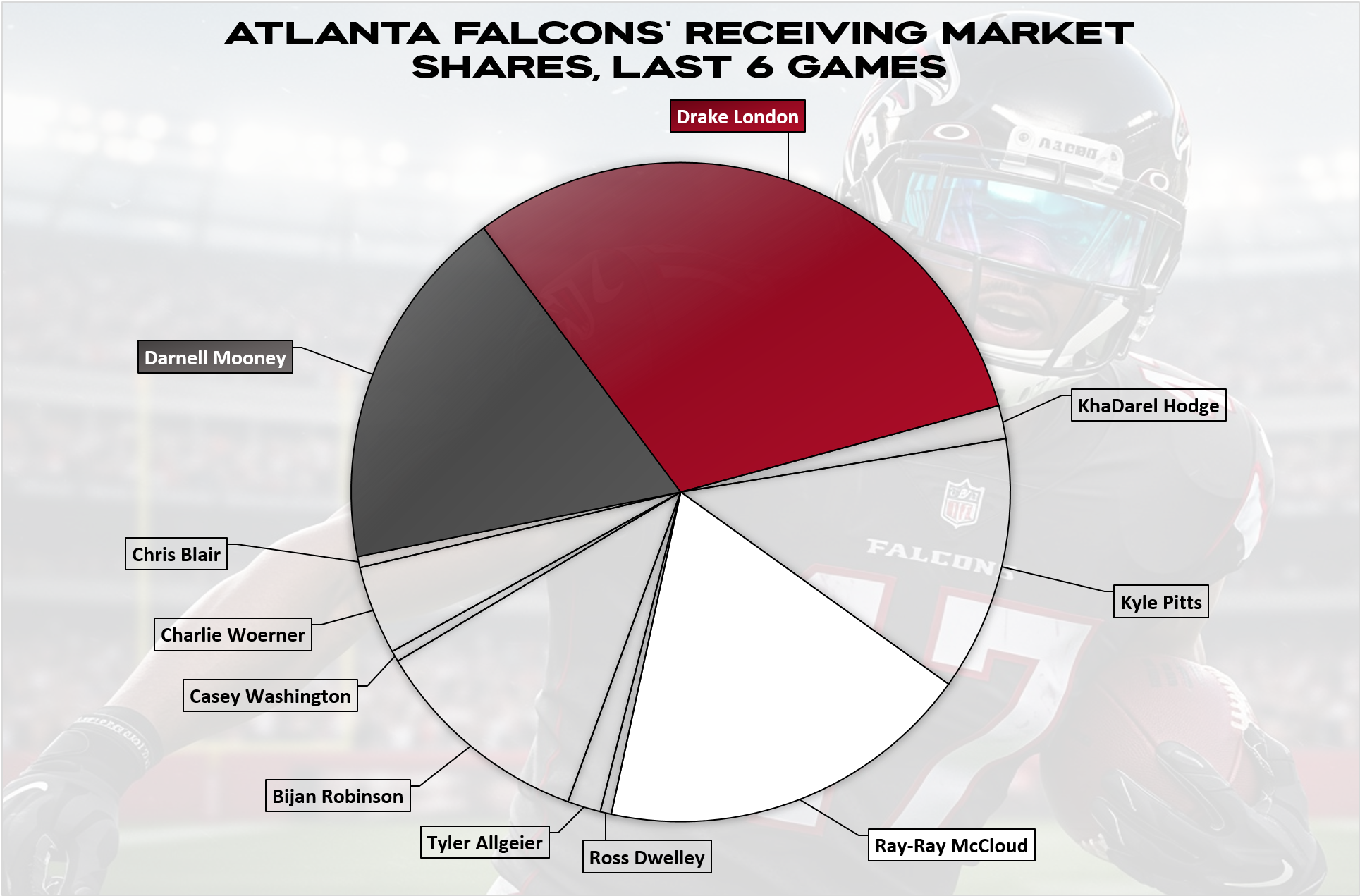
London has become one of the marquee fantasy WRs. For the season, he has drawn the sixth-most targets, translating to the eighth-most targets and the 12th-most receiving yards and receiving TDs. His production is entirely about opportunity; he ranks 12th in EP/G and 88th in FPOE/G. Considering he ranks 12th among WRs in TDs, an FPOE this low is rare. Some possible reasons it is so low might be that he is 39th in catch rate or 85th in YAC. London is 26th in Y/RR across all positions, another all-encompassing efficiency metric favoring London far more. His discrepancy in the two is among the highest in the league.
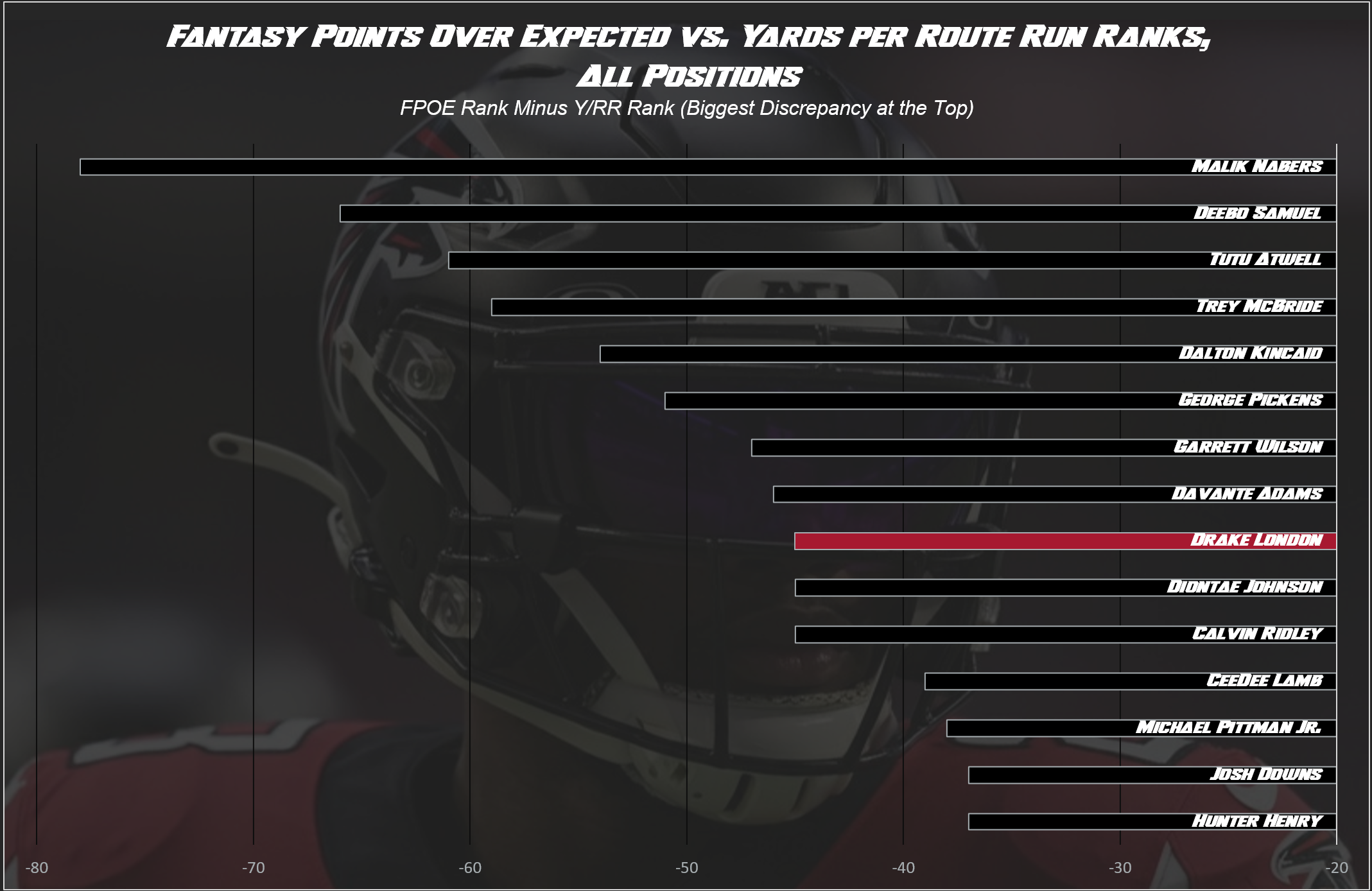
London ranks seventh in first-read targets among all WRs and TEs. London had an injury scare last week, but he says he expects to play and put in a full practice on Friday.
Washington ranks 24th in EPA per play allowed and 15th in defensive success rate. They rank 23rd in EPA per dropback allowed and 15th in defensive success rate on dropbacks allowed.
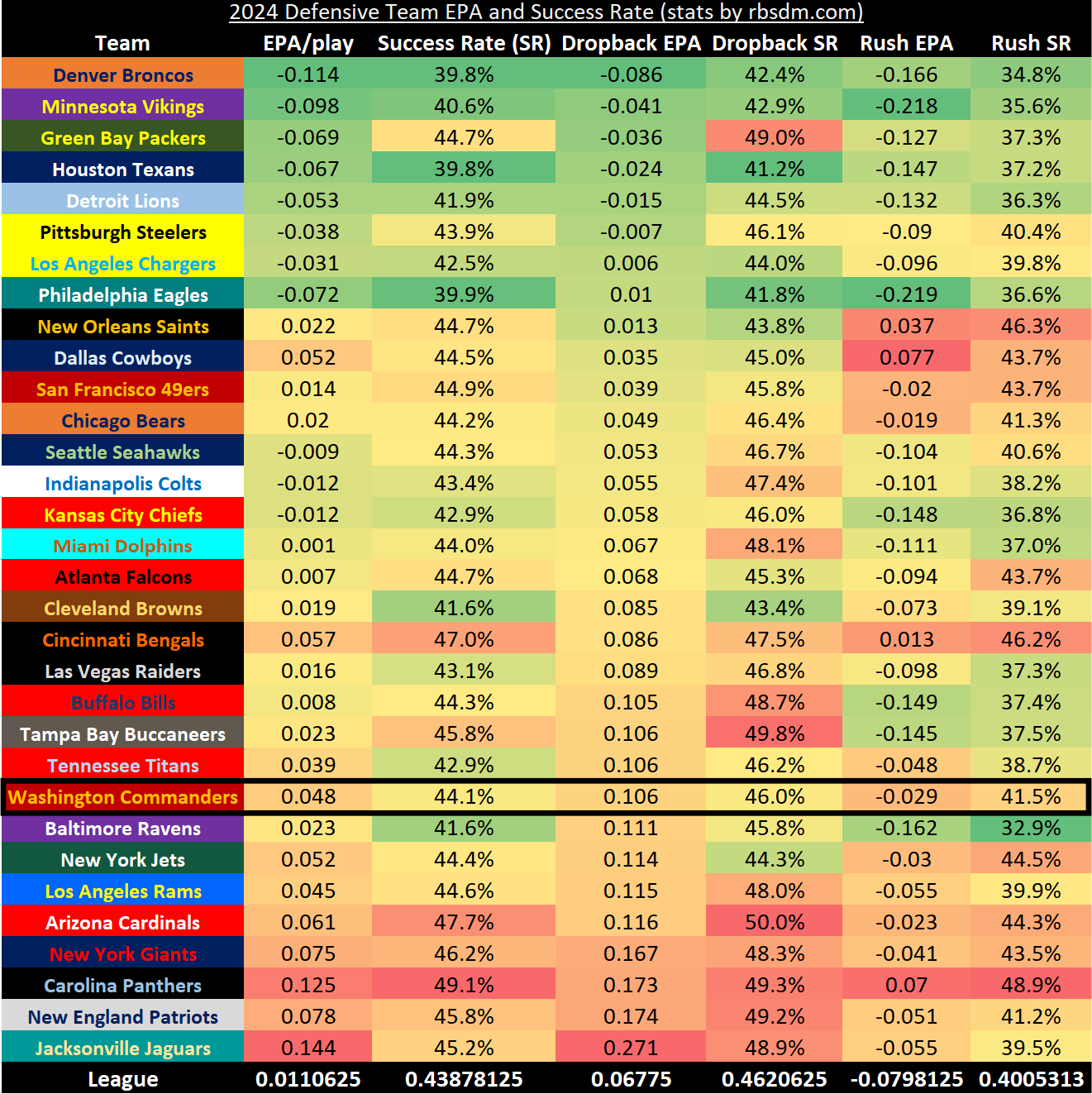
The Commanders began the year poorly on defense, owning the worst EPA per play allowed (-0.305) and worst EPA per dropback allowed (-0.499).
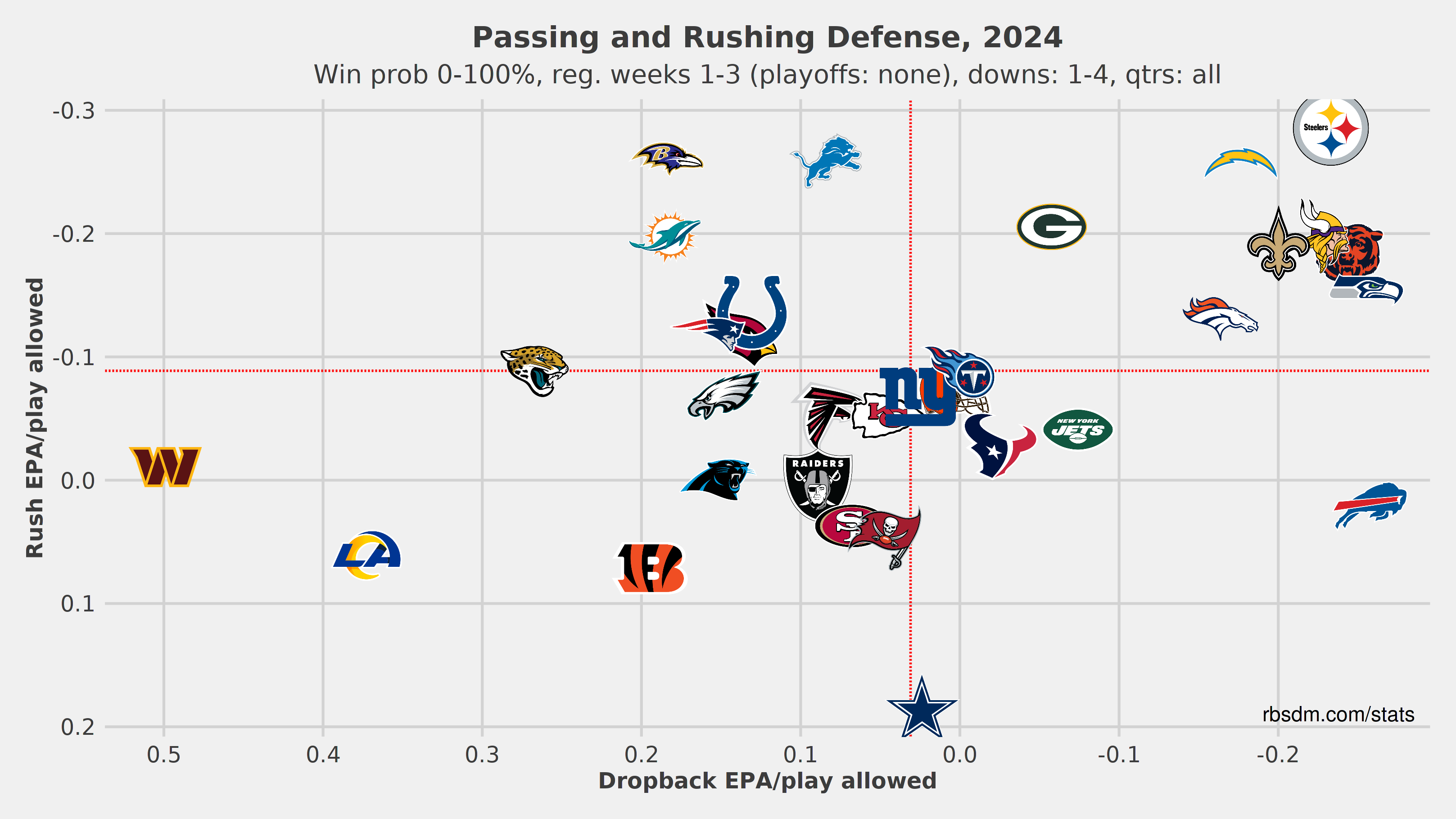
Since Week 4, they rank ninth in EPA per play allowed (-0.012) and sixth in EPA per dropback (0.004).
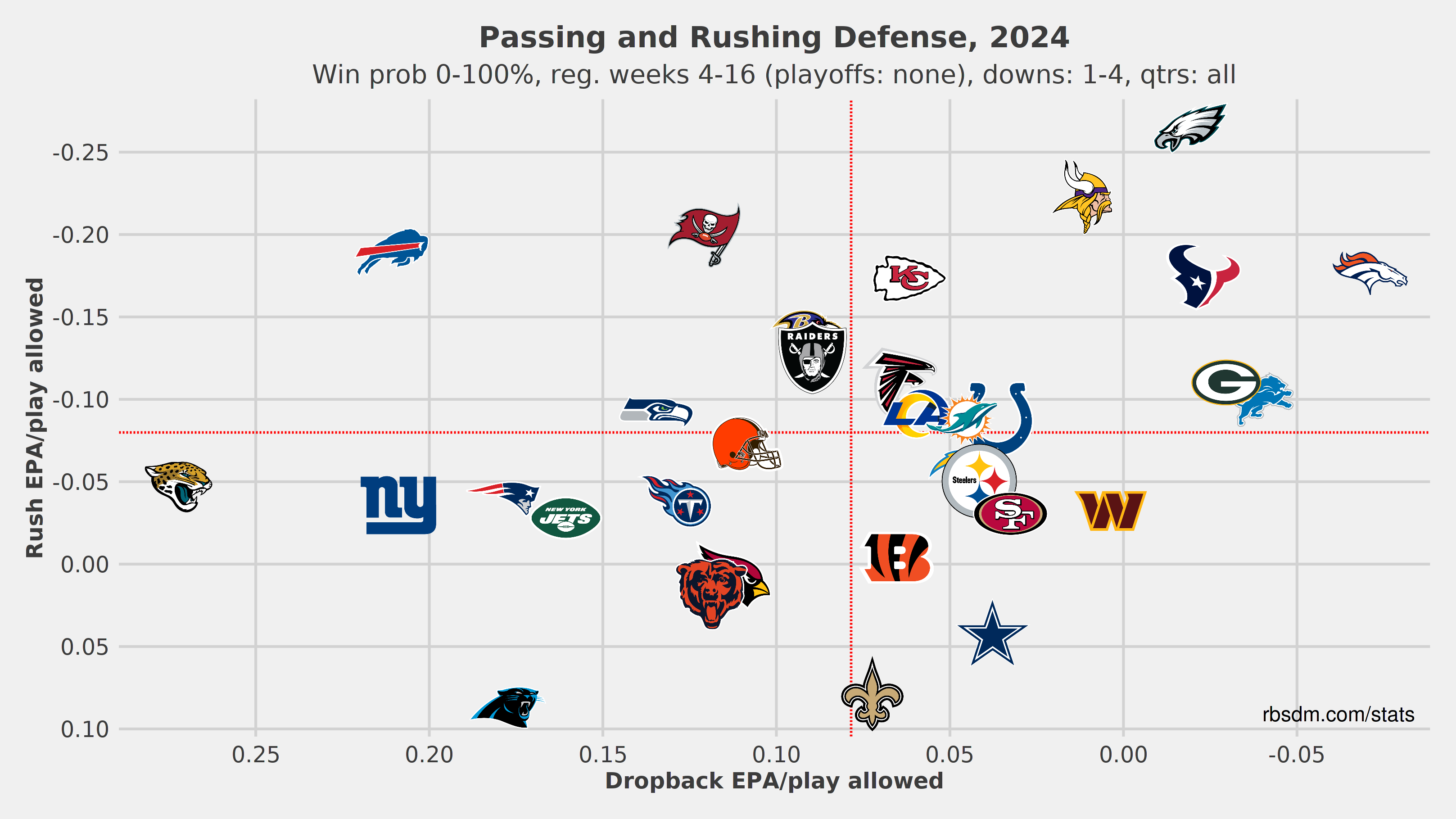
This marks the best improvement in either statistical category in these splits. I think it’s mostly been ironed out for most attentive fantasy managers by now, but we need to let go of any anchoring bias that may inform us that Washington is a bad defense, especially against the pass. They are almost just the opposite.
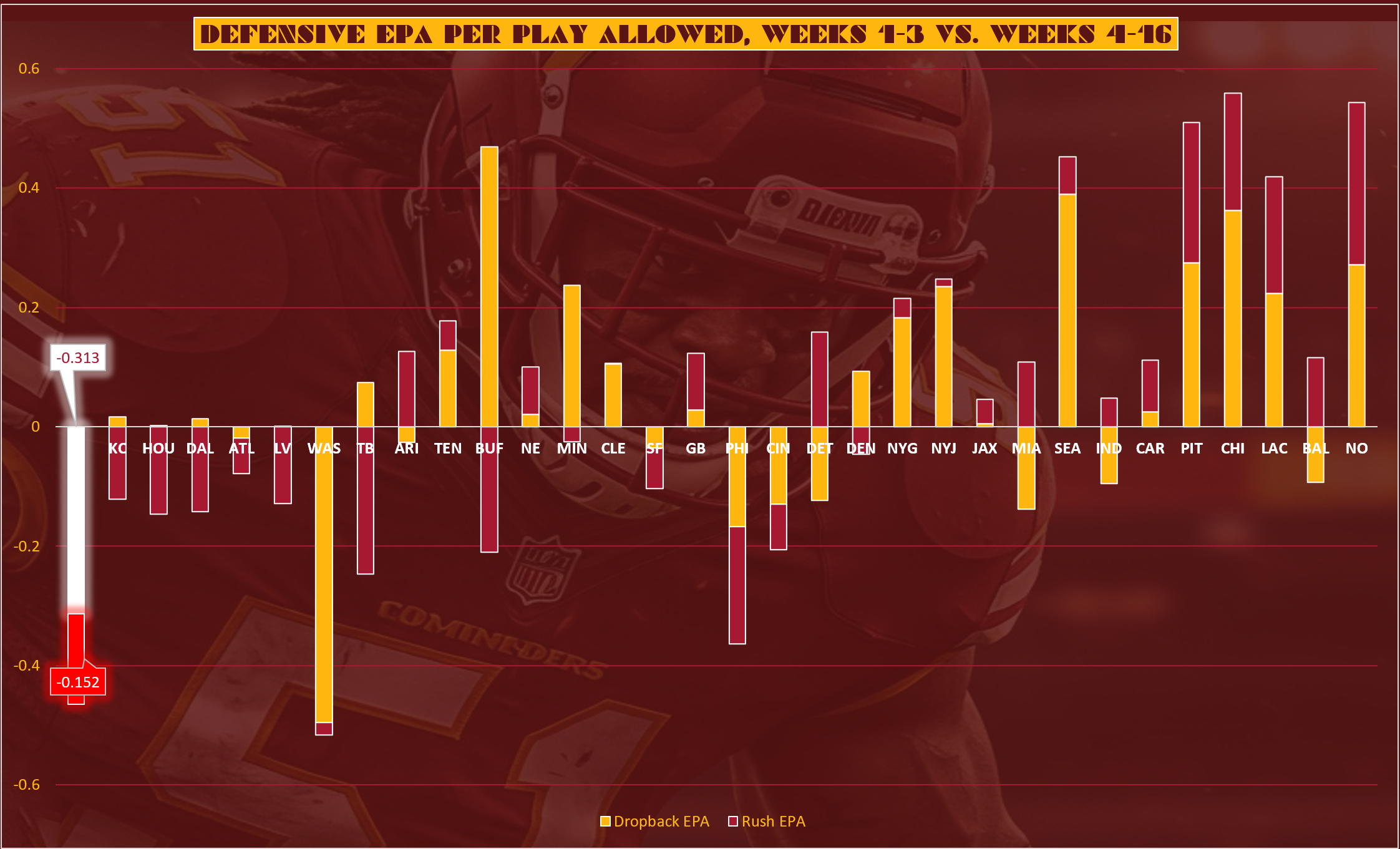
The Commanders use man-to-man defense 33.9%, ranking seventh. Their primary alignment is Cover 1 (28.6%), followed by Cover 3 (26.2%), and Cover 2 (19.0%). They use Cover 1 and 2 at the seventh-highest rate in the league as well as Cover 2 Man, although this only amounts to 2.4% of plays.
According to Fantasy Points’ Matchup Expected Fantasy Points model, London ranks 13th with 0.53 expected points per route based on the types of rates and coverages the Falcons should expect on Sunday night. Mooney ranks 44th, and no one else ranks in the top 80.
London plays almost equal parts in the slot and on the right; he would have been expected to draw shadow coverage from Marshon Lattimore had he returned from injury, but Lattimore will not be active Sunday night. Instead, London is expected to see an equal portion of three Washington CBs: Mike Sainristil, Benjamin St-Juste, and Noah Igbinoghene. London should have an advantage against any one of these CBs. Sainristil is steadily becoming a good corner in this league as the season progresses and represents the toughest matchup, but London seems markedly better than any one Washington defensive back.
Mooney should line up against Igbinoghene the most, which is a matchup he can handle. Pitts draws a horrible assignment here, likely to see plenty of long-time stud Bobby Wagner—not that you’re playing him.
One of the Falcons’ advantages this week should be in the trenches. Their pass-blocking unit allows the fifth-lowest pressure rate over expected (PrROE). The Commanders’ defense only generated PrROE at the 19th-highest rate. Together, they give Atlanta the fifth-biggest advantage of the week in pass protection.
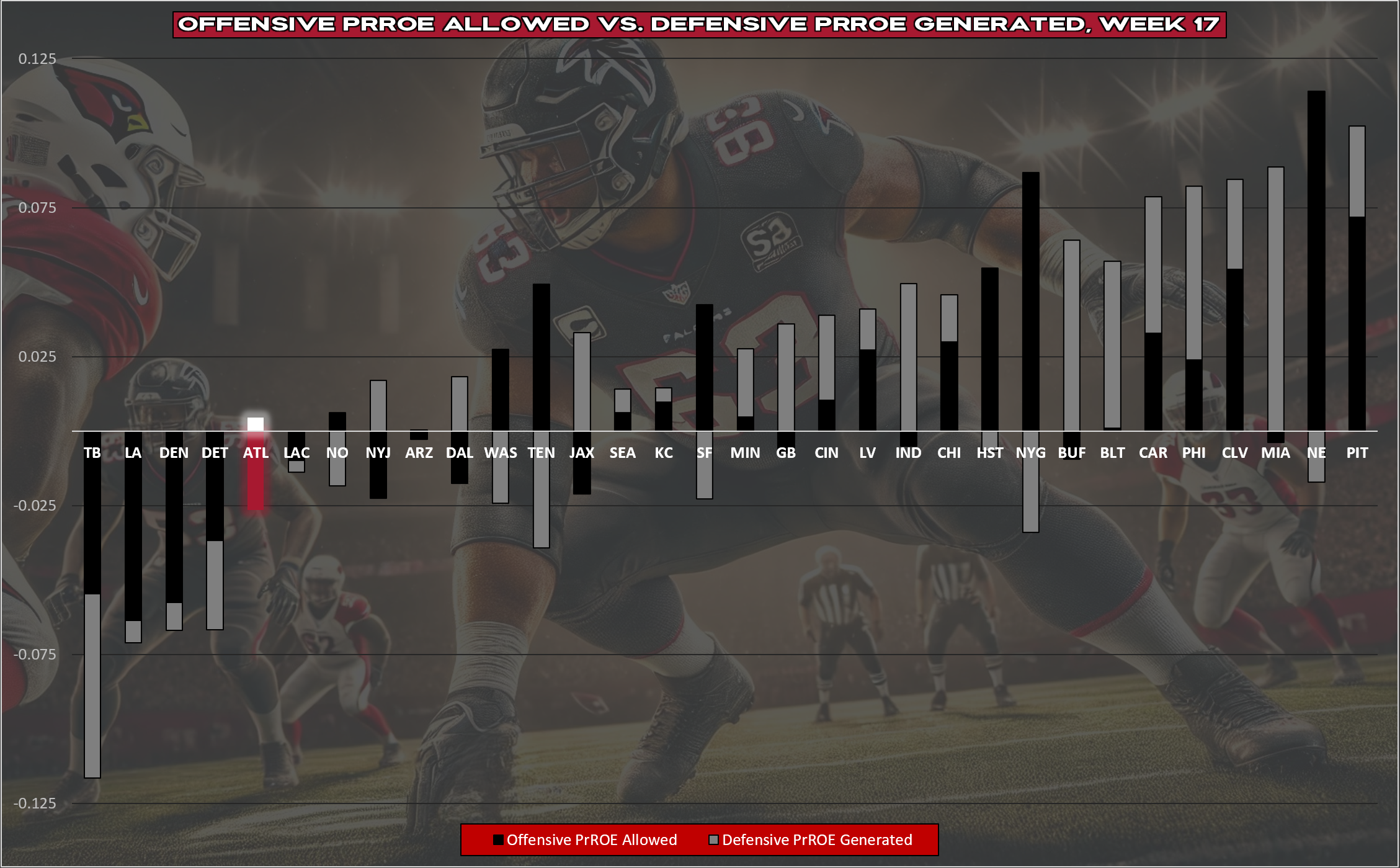
This advantage carries over into the Falcons’ run-blocking matchup, where they should also be in control.


